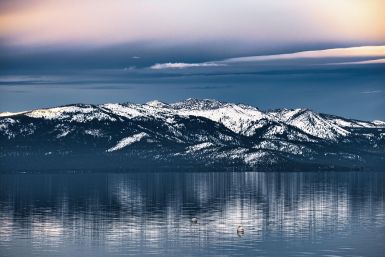If Iceland's Katla Volcano awakens from slumber and erupts, Icelanders and air travelers won't be the only ones affected. Eruptions from large volcanoes have wreaked havoc on Earth's ecosystem by lowering temperatures and thinning the ozone layer.
ranina sanglap
Oct 18, 2011
A new and strange phenomenon is baffling scientists. This is the case of the vanishing lakes in the Arctic which can have an impact on local wildlife and human populations, researchers said.
Genalyn Corocoto
Oct 18, 2011
Hackers broke in and ruined Sesame Street’s YouTube account on Sunday. According to reports, malicious, obscene, and hardcore pornographic scenes were posted in replace for the original and family friendly videos of Ernie, Bert, and the rest of the gang.
Karen Mae Cordon
Oct 17, 2011
In a worst case scenario, the shrinking of plants and animals due to climate change and drought could affect food production in the coming years.
Genalyn Corocoto
Oct 17, 2011
The predictions present a doomsday scenario. In 2012, violent solar flares will explode causing relentless radiation storms that will result in the devastation of nuclear plants and power grids, cause a crippling effect on communication systems, and destroying our current way of life.
Genalyn Corocoto
Oct 17, 2011
This letter appeared in the Washington Post on August 12, 2010. It was written to Dr. Michael Fox, who writes a regular column for the newspaper.
Jamelle Agbuis
Oct 17, 2011
While it brought fear to some who believed that Comet Elinen would bring the Earth to extinction, astronomers now say that only a stream of debris of the supposedly “doomsday comet” have reached the atmosphere.
Genalyn Corocoto
Oct 17, 2011
“Judgment day is near!” says Harold Camping, the radio preacher who predicted that the world would end on May 21. He hasn’t backed down from his claims and is now saying that everything will end on Friday, October 21.
Karen Mae Cordon
Oct 17, 2011
Over a thousand birds had been found dead since MV Rena's reef crash resulting in oil spill almost two weeks ago, as operations in oil removal have been stopped because media vessels are getting too close to the ship.
Arlene Paredes
Oct 17, 2011
Melbourne-based sustainable fashion collective The Clothing Exchange has a big plan; the group wants to help fashion-conscious Australians find great styles while also raising awareness of the environmental impact of the fashion industry.
Jamelle Agbuis
Oct 17, 2011
The 2.4 ton ROSAT X-ray telescope is expected to crash to Earth between October 20 and October 25, not November as earlier predicted due to enhanced solar activity.
Genalyn Corocoto
Oct 16, 2011
The European Extremely Large Telescope (E-ELT), also known as the alien hunter telescope will be the most gigantic optical telescope all over the world. Its mirror alone will have 137 feet wide or half the size of a regular football field.
Karen Mae Cordon
Oct 14, 2011
More than 1.7 million Australians will suffer from Macular Degeneration in the next 20 years, according to a Dekoitte Access Economics report. The figures shows a remarkable rise of 70 % in the prevalence of the leading cause of blindness in Australia.
Lawrence Villamar
Oct 14, 2011
NASA scientists are flying a suite of instruments on two planes as part of the Operation IceBridge which is now on the third year of its critical study of the changing ice of Antartica.
Genalyn Corocoto
Oct 14, 2011
Video proof of the Yeti finally emerged from the wilds of Siberia and presented to the international community after reports on Monday that the research team had stumbled on indisputable proof of the creature's existence.
ranina sanglap
Oct 14, 2011
Those who want to experience a suborbital ride and get a view of the Earth may soon realize their wish.
Genalyn Corocoto
Oct 14, 2011
Archaeologists have made a surprising discovery in a South African cave that seems to double the time humans have been artists.
Joseph Alan Alonso
Oct 14, 2011
Bacteria are so associated with pathogenic issues meaning disease-causing entities. It is so widespread, yet minute that it is easy to consider it as almost inanimate. In reality, bacteria is not associated only with diseases, but may be found on top of the mountains, deep down oceans, animal gut, man, frozen ancient rocks and ice of Antartica.
Gladys Denia
Oct 14, 2011
Iceland's Katla Volcano, which has a magma chamber that is ten times the size of Eyjafjallajokull, is showing signs of an imminent eruption.
ranina sanglap
Oct 14, 2011
A new study in human evolution has pointed to sugar as one of the key ingredients that made the difference between man and his evolutionary cousin, the ape.
Genalyn Corocoto
Oct 14, 2011
After the MV Rena oil spill, cleanup teams are currently working on removing the toxic wastes on the shore. Five hundred clean up personnel were out on the beaches on Thursday. They are clearing the coasts from Whangamata to Whakatane to assess the situation and check areas that need more attention.
Oct 14, 2011
Barring weather interruptions, Thursday's night sky will show the moon and planet Jupiter shining close to each other in a spectacular view at around 10:00 pm EDT from mid-northern latitudes.
Arlene Paredes
Oct 14, 2011
There has been an outpouring of help from volunteers who showed their eagerness to help authorities in cleaning operations around the beaches of New Zealand’s Bay of Plenty.
Joseph Alan Alonso
Oct 14, 2011
Perth Zoo is bidding goodbye to an endangered Sumatran orangutan that it has bred since birth six years ago. The animal named Semeru will be reintroduced into the jungles of Indonesia's Sumatra island to repopulate the species now numbering only 6,300.
Windsor Genova
Oct 14, 2011
The MV Rena oil spill has been a major disaster. It is slowly killing New Zealand’s abundant natural beauty and the effects of oil spill will have a huge impact on marine creatures and birds. Recently, when everyone else is busy helping out in cleaning the thick oil covering the shore, scam artists are also busy calling concerned people.
Karen Mae Cordon
Oct 14, 2011
Treating cancer is BIG business in America -- in fact, it's a $200 billion a year business. Yet 98 percent of conventional cancer treatments not only FAIL miserably, but are also almost guaranteed to make cancer patients sicker.
Jamelle Agbuis
Oct 14, 2011
Treating cancer is BIG business in America -- in fact, it's a $200 billion a year business. Yet 98 percent of conventional cancer treatments not only FAIL miserably, but are also almost guaranteed to make cancer patients sicker.
Jamelle Agbuis
Oct 14, 2011
The pet products industry is burgeoning, as 2011 figures released by the American Pet Products Association (APPA) show that Americans now spend more than $50 billion a year on food, supplies, and veterinarian care for their pets -- up nearly 300 percent since 1994.
Jamelle Agbuis
Oct 14, 2011
The Iranian Space Agency (ISA) has failed to send a live monkey into space using the country's indigenous rocket.
Windsor Genova
Oct 14, 2011
Fifty people, mostly students, were injured while parts of Hindu temples crumbled during a magnitude 6 earthquake and an aftershock in Bali, Indonesia on Thursday.
Windsor Genova
Oct 14, 2011









